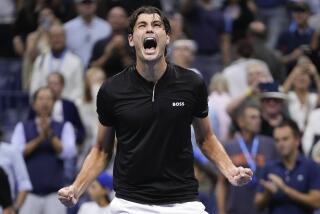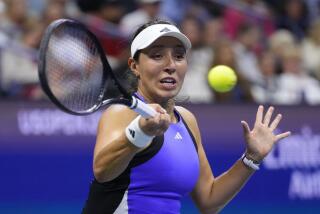Stylish Becker and Agassi Will Clash in Semifinals
- Share via
NEW YORK — The curtain went up on the Boris Becker Show Thursday at the U.S. Open, where the defending champion showed he can deliver a volley or a punch line with equal aplomb.
First, the volley. Actually, there were streams of them, all directed toward Aaron Krickstein’s feet.
At least Krickstein, ceremoniously dumped in the quarterfinals, 3-6, 6-3, 6-2, 6-3, took a set from Becker for the first time.
Head down, wiping his face with a towel, Krickstein grimaced slightly. “That’s better than nothing, I guess,” he said.
And now, there’s nothing that can stop Becker from reaching his second consecutive U.S. Open final except for Andre Agassi. A vision in lime green, black and white, Agassi shaved his beard and trimmed Andrei Cherkasov, 6-2, 6-2, 6-3, under the lights.
Agassi advanced to his third consecutive U.S. Open semifinal at the expense of Cherkasov, a 20-year-old Soviet player competing in only his second Open.
“There was not a whole lot of things that I could have done better,” Agassi said. “I hope to play just as well next time.”
That would be against Becker. In the interview room after his match, Becker did not seem too concerned by the competition for his title.
Question: What are your chances?
Answer: Pretty good.
Q: Have you watched Agassi play?
A: Yes.
Q: Can you match his wardrobe?
A: It doesn’t fit me.
Q: What would you anticipate from a match with him?
A: A long match.
Becker dispatched Krickstein with relative ease, 2 hours 36 minutes of power tennis that didn’t really begin all that well for him.
Krickstein, who had lost four times previously to Becker without winning a set, took the first one in 43 minutes. But it wasn’t so much a case of Krickstein playing well as it was of Becker’s early game stalling.
Fourteen of Becker’s 30 unforced errors occurred in the first set and he also won fewer than half of the points he served, as Krickstein dictated play and Becker was content to stay near the baseline.
After taking that landmark set, Krickstein quickly began looking for another. He led, 2-0, in the second set when a thought suddenly came to Becker.
“Well, you know, I thought to myself, ‘Now I have to start to play,’ ” Becker said.
The balls that Krickstein had been sending deep into the corners began landing shorter and nearer the middle of the court, which played into Becker’s hands.
Becker explained: “He plays the ball deep, and then I have to wait. And then I can approach and come in.”
Krickstein expressed another view: “He has an aura about him.”
Krickstein knew he had blown his chance, but he wasn’t quite sure why he didn’t play as well as he had expected.
“I was in control,” Krickstein said. “He wasn’t playing too well, he was giving me every opportunity to take a big lead, (and) I lost a lot of confidence the rest of the match.”
Krickstein’s confidence flagged even further in the fourth set. Already down by a set after losing the second and third, he took a 3-0 lead in the fourth, then didn’t win another game.
Krickstein blamed Becker, saying: “He raised his game to a higher level.”
For the better part of the year, Becker’s game has been on a fairly high level. Only twice in 12 tournaments has he failed to reach at least the quarterfinals.
And although he has not won a tournament since February, losing in the first round of the French Open and in the final at Wimbledon, Becker doesn’t exactly feel as though he needs to win the U.S. Open to salvage a washout of a year.
“I’m very close to No. 1,” he said. “I don’t think that it is that bad, actually.”
U.S. Open Notes
It has taken Steffi Graf 11 days, five matches and 3 hours 7 minutes on the court to reach today’s semifinal match against Arantxa Sanchez Vicario, but Graf will never be able to live down her upset loss to the then-little-known Sanchez Vicario in the 1989 French Open final. “She will fight for every point,” Graf said. “She won’t give me anything like some other players do.” Sanchez Vicario, who is 1-7 against Graf, said there are no lingering effects from the one big upset in Paris. “I think that the French is past, and she is not thinking about that--and me either,” Sanchez Vicario said. “She knows I’m tough, and I know she is the best, she is No. 1, but I don’t have anything to lose. I’m going to play my game, and the way that I play, I think that I can beat her again.”
In the other semifinal match, Gabriela Sabatini faces Mary Joe Fernandez. They are 5-5 against one another. Sabatini, who is in her third U.S. Open semifinal, fired Angel Giminez as her coach after the French Open and hired former Brazilian player Carlos Kirmayr, who is encouraging a more aggressive, attacking game. However, Sabatini has shown little tendency to come to the net so far and probably wouldn’t be here if Monica Seles had not been upset in the third round. On the other hand, Fernandez has benefited directly from Martina Navratilova’s upset loss in the quarterfinals. A first time U.S. Open semifinalist, Fernandez seems to be recovered from injuries to a shoulder, a hamstring and a knee, which forced her out of three of her last six tournaments. She still holds the record as the youngest player to win a match in the Open--14 years 1 month, when she defeated Sara Gomer in the first round in 1985.
More to Read
Go beyond the scoreboard
Get the latest on L.A.'s teams in the daily Sports Report newsletter.
You may occasionally receive promotional content from the Los Angeles Times.










